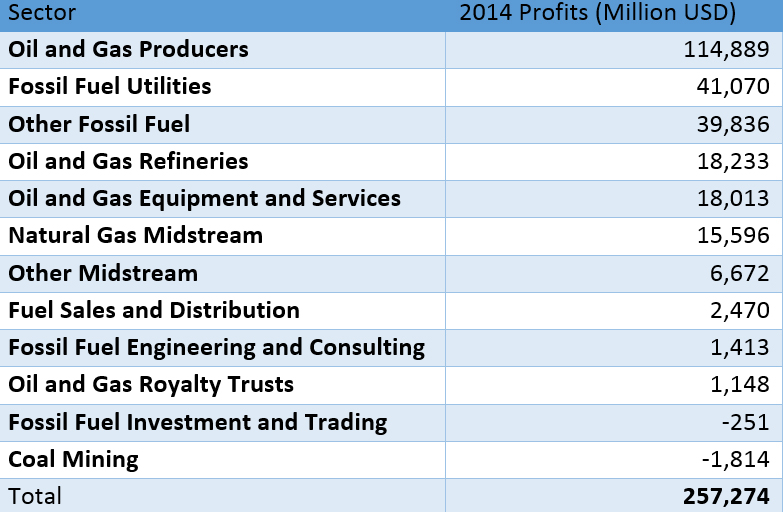May 2015
$257 billion
If this figure represented a country’s GDP, it would rank 41st in the world, about the same as Chile.
Instead, $257 billion is the profit made in 2014 by public companies involved in extracting, transporting, refining, distributing and trading in fossil fuels in the United States and Canada. Despite these massive profits, the fossil fuel industry continues to receive tens of billions of dollars in subsidies every year at the expense of U.S. taxpayers. While these companies reap their benefits, communities across the country suffer the impacts of climate change, oil spills and water contamination from fracking, drilling and mining.
This includes many foreign companies – like Shell and BP – that, although they do not earn the majority of their profits in North America, are major players in American and Canadian oil, gas and coal industries.
The utility companies included for this analysis are natural gas utilities, as well as electric utilities and power producers that generate or purchase a major share of their electricity from oil, gas and coal. Similarly, only investment and trading firms that deal primarily with fossil fuel companies have been counted.However, profits from major Chinese companies, including PetroChina and China National Petroleum Corporation, were not included despite their significant interests in Canadian tar sands because to date their North American activities make up a tiny share of their total profits.
Source: Bloomberg
Because private companies are not required to disclose their financial information, a significant share of fossil fuel industry profits cannot be counted. Notably, the profits of Koch Industries, the second largest privately held company in the United States and a major refiner and trader of fossil fuels, are not included, though Forbes estimates the company’s 2013 annual revenue at $115 billion.
Many of these companies contribute millions of dollars in campaign finance to representatives and senators in the U.S. Congress, as well as to delegates and senators in State houses in key fossil fuel states around the country. This ensures that U.S. politicians represent the fossil fuel industry’s interests above those of the people that elected them. Fossil fuel industry lobbying expenditure and contributions to the U.S. Congress amounted to over $326 million in the 113th Congress (2013-14).
2014 profits were down on 2013 numbers, primarily due to the decline in oil prices in 2014. A brief analysis of this can be found here.


